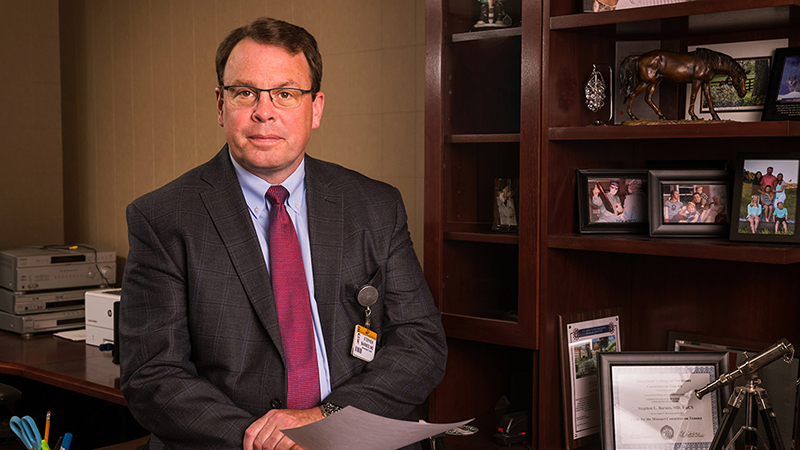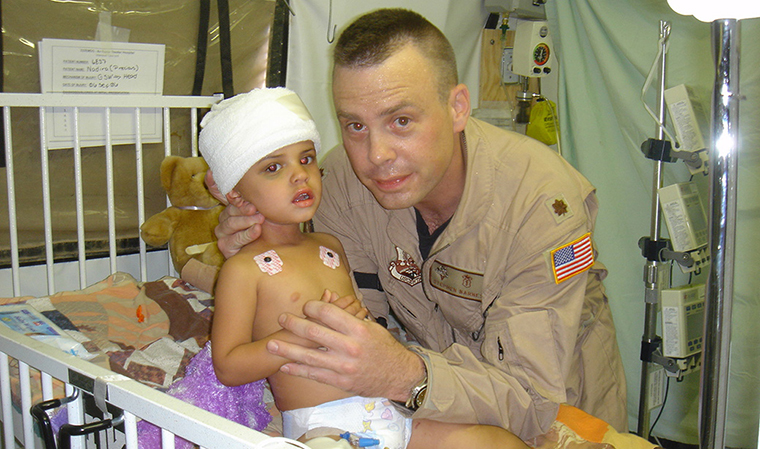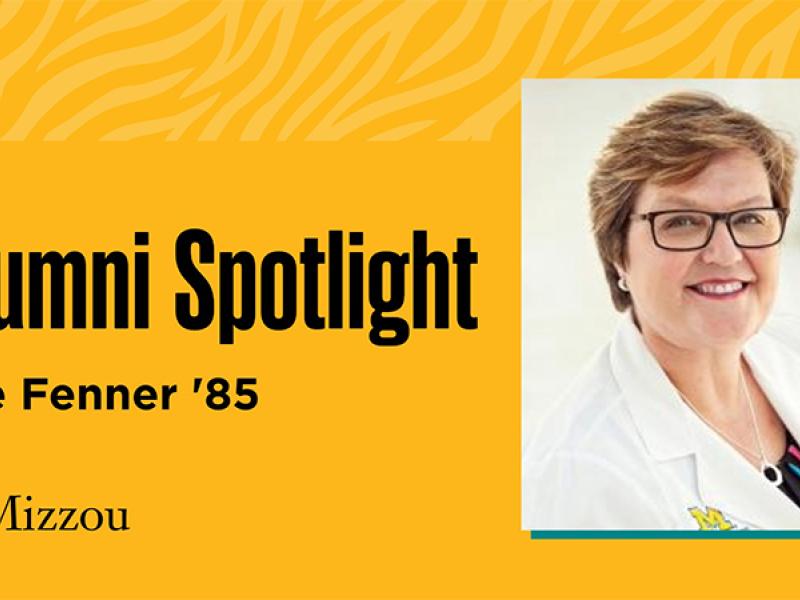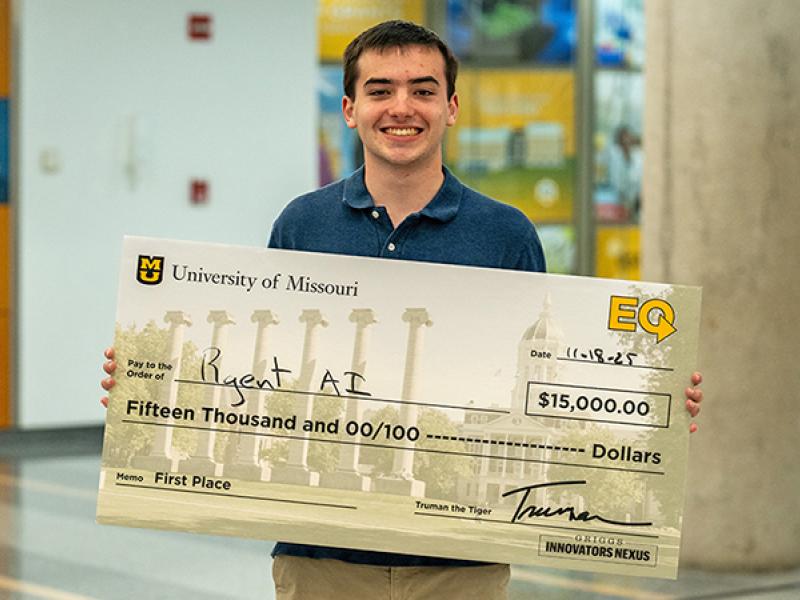
A lot has changed in the 14 years since Stephen Barnes, MD, received a letter titled “Pay It Forward” that he still keeps on his desk. Barnes has more responsibilities, a bigger office and a longer title — the Hugh E. Stephenson, MD, Endowed Chair for the Department of Surgery — but he still reads the letter often to remind himself why he came to the University of Missouri and the kind of leader he wants to be.
The story begins in the fall of 2007, when Barnes made a trip to Columbia that was supposed to be a courtesy visit. He had just finished his active duty in the Air Force, where he had made quite a name for himself as part of the group that reimagined the way the U.S. military treated and transported wounded soldiers. He had planned to start his civilian career as a trauma surgeon at East Carolina University.

But when Barnes visited MU, he saw a lot to like. It offered a chance to build a trauma program in a great place for Barnes and his wife, Mary, to raise their four children. In fact, the job checked all the personal and professional boxes on his wish list except one: Columbia wasn’t within 90 miles of an ocean … but Barnes figured the Lake of the Ozarks was a large enough body of water to make an exception.
There was still the matter, though, of informing the chair of surgery at East Carolina that he had changed his mind. That man, Michael Rotondo, MD, who is now vice dean for clinical affairs at the University of Rochester School of Medicine, had been excited about hiring a recruit he described as a “larger-than-life character and very self-assured, but with a degree of emotional intelligence that allows him to adapt and work extremely well with people.” When Barnes told him about the opportunity at MU, Rotondo made a lasting impression with his response.
“He called me back and said, ‘You should definitely take that job. That job is you,’” Barnes said. “Then he sent me this beautiful letter.”
***
The letter begins: “OK, you have your job. Now here is what you owe me for my role in all of this.” It goes on to highlight what Barnes should strive to be as a leader in clinical care, education and research.
He set out to live up to the challenge.
Within six months of his arrival in 2008, Barnes was put in charge of the new Division of Acute Care Surgery. That allowed him to help build a team of like-minded trauma surgeons and start focusing on improving outcomes.
“People who end up doing trauma run toward the smoke and flames rather than away,” Barnes said. “It has some pretty decent parallels to being a firefighter. We sit and wait, and at a moment’s notice, we respond and make decisions. I like the impact. You see someone who’s nearly dead, and then you see them six months later and they’re back to their life. What could be better than that?”
Ten months after Barnes’ arrival, MU Health Care regained its status as a Level I trauma center, which it had lost in 2005. Three years after Barnes arrived, MU Health Care moved from the bottom decile to the top decile in the American College of Surgeons’ Trauma Quality Improvement Program’s system. It has maintained its standing in both of those metrics ever since.
Barnes helped improve the division’s educational profile by rebuilding the Surgical Critical Care Fellowship program. Among the division’s research highlights was the establishment of the Combat Casualty Training Consortium made possible by a $5.3 million grant from the U.S. Department of Defense.
When COVID-19 advanced toward Missouri, the scope of Barnes’ duties expanded. He was tabbed as the planning chief of MU Health Care’s incident command team. He leaned on his military experience tackling the logistical puzzle of global patient movement to help the health system prepare for the pandemic and adjust to all its complications.
“I’m a numbers person, so I was not going to let panic and Facebook make the decisions for us,” Barnes said. “We needed to figure out who was responsible for what and who had what skillset and figure out how to make some data-driven decisions for central Missouri that puts us in the best stance to take care of this thing we didn’t understand. Then we rapidly learned to understand it. Our operating rooms have been open more than most others in our region.”
In February 2021, he accepted the position as interim chair of the Department of Surgery. Six months later, he shed the interim label.
***
Barnes spent so much of the past year taking recruits out to eat, he joked that he’s on a first-name basis with the servers at Columbia’s top restaurants. Specifically, Barnes has been focused on expanding in the areas of neurosurgery — which was recently enhanced from a division to a department — plastic surgery and cardiac surgery.
Another key focus area has been improving the surgical training experience for medical students and resident physicians.
“Really, it’s just an investment in time,” Barnes said. “Rather than saying, ‘Come watch me take care of a patient,’ spend more time focused on the learners’ needs.”
Without realizing it, Barnes was voicing the sentiments in the final part of the letter on his desk — that the best way to repay the debt to his mentors is by giving generously to the next generation. He has become the leader he wanted to be.
“Your day will come when you have the same opportunity that I have had with you,” the letter concludes. “Get to know a rising talent and assist in some small way in their development. Do it, not because you expect anything in return, but rather because you know that it is the right thing to do. It may cost you time and money, but in the end, you will further the cause and reap the benefit of joy in helping launch someone on a very important mission — a mission in which you believe deeply. Pay it forward.”
Getting to Know: Stephen Barnes, MD
SURF’S UP: In the late 1980s, as “Baywatch” captured America’s imagination, Barnes decided to take a break from his pursuit of a mechanical engineering degree at Auburn University and become a professional lifeguard in Hilton Head, South Carolina.
“I was David Hasselhoff,” he joked.
For 2½ years, he patrolled the island’s beaches.
“There were riptides and shark attacks, and I remember driving 90 mph on a four-wheeler down Harbor Town golf course because someone had keeled over after they teed off,” Barnes said. “There’s a lot of good memories from Hilton Head — I was able to become a paramedic and learn more about medicine — but a lot of it was silly questions from tourists all day long. Eventually, I came to the conclusion I should go back to school, pay attention and pursue a career in medicine.”
MAN ON A MISSION: After four years of med school at the University of Alabama Birmingham and seven years of surgical training at the University of Kentucky, Barnes began an Air Force active-duty stint in 2004. He was assigned to the Center for Sustainment of Trauma and Readiness Skills (C-STARS) program in Cincinnati and was part of a team that created a new global patient transport system and trained military medical personnel to use it in the wars in Afghanistan and Iraq.
“It really changed the face of military care forever,” said Michael Rotondo, MD, a trauma surgeon at the University of Rochester who is one of Barnes’ mentors. “It’s never going to go back to what it was.”
GREAT ESCAPES: Away from the pressures of work, Barnes enjoys the outdoors and spending time with his four children and wife, Mary.
“He’s got kids who are excelling in what they do, and he’s been able to dedicate so much of his life to this place and the department, and all of that is possible because Mary Barnes is a saint among mortals,” said MU Health Care trauma surgeon Jeffrey Coughenour, MD, who has known Barnes for two decades. “She truly is an amazing person.”
If Barnes and his family need a quick getaway, they can visit the 80-acre property near Moberly, Missouri, that he named “Sanity Maintenance.” It has a house, barn, fishing pond and fields for hunting.
“I send photos to my friends in Alabama,” Barnes said, “and they are in awe of the size of deer and turkey in Missouri.”





